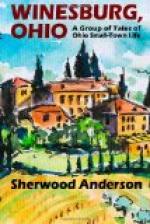Seth arose from his place on the grass and went silently past the men perched upon the railing and into Main Street. He had come to a resolution. “I’ll get out of here,” he told himself. “What good am I here? I’m going to some city and go to work. I’ll tell mother about it tomorrow.”
Seth Richmond went slowly along Main Street, past Wacker’s Cigar Store and the Town Hall, and into Buckeye Street. He was depressed by the thought that he was not a part of the life in his own town, but the depression did not cut deeply as he did not think of himself as at fault. In the heavy shadows of a big tree before Doctor Welling’s house, he stopped and stood watching half-witted Turk Smollet, who was pushing a wheelbarrow in the road. The old man with his absurdly boyish mind had a dozen long boards on the wheelbarrow, and, as he hurried along the road, balanced the load with extreme nicety. “Easy there, Turk! Steady now, old boy!” the old man shouted to himself, and laughed so that the load of boards rocked dangerously.
Seth knew Turk Smollet, the half dangerous old wood chopper whose peculiarities added so much of color to the life of the village. He knew that when Turk got into Main Street he would become the center of a whirlwind of cries and comments, that in truth the old man was going far out of his way in order to pass through Main Street and exhibit his skill in wheeling the boards. “If George Willard were here, he’d have something to say,” thought Seth. “George belongs to this town. He’d shout at Turk and Turk would shout at him. They’d both be secretly pleased by what they had said. It’s different with me. I don’t belong. I’ll not make a fuss about it, but I’m going to get out of here.”
Seth stumbled forward through the half-darkness, feeling himself an outcast in his own town. He began to pity himself, but a sense of the absurdity of his thoughts made him smile. In the end he decided that he was simply old beyond his years and not at all a subject for self-pity. “I’m made to go to work. I may be able to make a place for myself by steady working, and I might as well be at it,” he decided.
Seth went to the house of Banker White and stood in the darkness by the front door. On the door hung a heavy brass knocker, an innovation introduced into the village by Helen White’s mother, who had also organized a women’s club for the study of poetry. Seth raised the knocker and let it fall. Its heavy clatter sounded like a report from distant guns. “How awkward and foolish I am,” he thought. “If Mrs. White comes to the door, I won’t know what to say.”
It was Helen White who came to the door and found Seth standing at the edge of the porch. Blushing with pleasure, she stepped forward, closing the door softly. “I’m going to get out of town. I don’t know what I’ll do, but I’m going to get out of here and go to work. I think I’ll go to Columbus,” he said. “Perhaps I’ll get into the State University down there. Anyway, I’m going. I’ll tell mother tonight.” He hesitated and looked doubtfully about. “Perhaps you wouldn’t mind coming to walk with me?”




